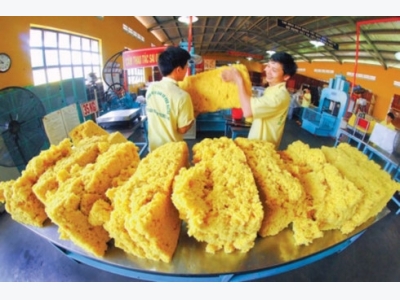Vietnamese natural rubber exports hit lowest level in 4 years

Vietnamese natural rubber exports fell 21.7% in volume and 29.5% in value month-on-month in April, according to the latest statistics from the General Department of Vietnam Customs.
The decrease is part of the continuing steady decline in overseas consignments the rubber segment has experienced in recent years, said Tran Ngoc Thuan, chair of the Association.
Mr Thuan noted that in the first four months of 2017 combined foreign sales declined 2.1% in total value compared to the same period in 2016, which represents a continuation of the steady decline in sales over the past four years.
The World Factbook reports that for the four-year period 2012-2016 Vietnamese exports of natural rubber plummeted 63.8%, tallying in at just US$904.1 million in 2016.
This compares to worldwide sales of US$4.4 billion for Thailand and US$3.4 billion for Indonesia in 2016, the two top global exporters of natural rubber and essentially places Vietnamese exporters as a group in a virtual tie with their counterparts from Malaysia and Côte d’Ivoire for third place.
Mr Thuan was quick to point out that the slowdown of the global automotive industry and declines in the cost of oil had contributed significantly to a drop in the selling price of rubber during the first four months of 2017.
He said the price on the global market had been hovering in the US$1,600-US$1,700 per metric ton range in March and April down from an averageUS$2,400 in January and February.
Mr Thuan added that a surplus of rubber in Thailand had also been a contributing factor putting downward pressure on the sales price.
The Association recently approached the Prime Minister with a list of proposals aimed at throwing a lifeline to the segment, said Mr. Thuan. Chief among them was a pitch for the government to declare the segment exempt from the value-added tax.
Since 2014, the government has exempted many agricultural products including farm raised fish and seafood from the value added tax but has not yet extended the preferential policy to natural rubber.
Mr Thuan said the list of recommendations to the Prime Minister also included a request to exempt the segment from the requirement to pay income taxes on their earnings.
Additionally, the Association somewhat inexplicably wants the government to develop national standards for rubber latex and regulate the quality of rubber latex raw materials.
This point is not entirely clear, as one would suppose that one of the chief purposes of the Association is to promulgate national standards for the natural rubber industry, which presumably they could implement themselves.
The Association recommended that the government issue legal documents directing rubber businesses to manage rubber wood sustainably in accordance with Vietnam environmental laws and regulations.
Lastly, the list included several recommendations relating to clarifying the issuance of certificates of origin for the segment.
Meanwhile, Deputy Minister Tran Tuan Anh of the Ministry of Industry and Trade noted the fundamental problem the segment is experiencing is that their products are considered inferior to those of competitors.
He suggested that the Association focus on reforming their technologies to improve product quality and less on issues related to value added and income taxes. The lack of competitiveness is the root of the problem, not taxes.
Có thể bạn quan tâm
 VN’s agriculture needs sustainable solutions
VN’s agriculture needs sustainable solutions Vietnam’s agriculture sector needs to improve productivity and quality as well as define the market structure for each farming product
 Bac Giang strengthens sci-tech application
Bac Giang strengthens sci-tech application By strengthening the application of scientific and technological achievements, Bac Giang Province has created distinct farming and breeding products
 Vietnam to export pork to China amid supply glut
Vietnam to export pork to China amid supply glut Local farmers have seen prices fallen sharply as a surplus of 200,000 tons of pork is expected this year.